新概念第二册 第二课 Breakfast or Lunch
新概念英语2 Lesson2 breakfast or lunch
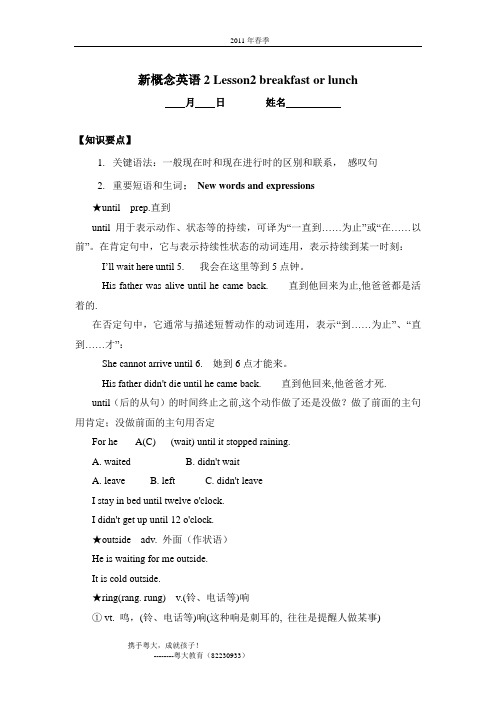
新概念英语2 Lesson2 breakfast or lunch月日姓名【知识要点】1.关键语法:一般现在时和现在进行时的区别和联系,感叹句2.重要短语和生词:New words and expressions★until prep.直到until用于表示动作、状态等的持续,可译为“一直到……为止”或“在……以前”。
在肯定句中,它与表示持续性状态的动词连用,表示持续到某一时刻:I’ll wait here until 5. 我会在这里等到5点钟。
His father was alive until he came back. 直到他回来为止,他爸爸都是活着的.在否定句中,它通常与描述短暂动作的动词连用,表示“到……为止”、“直到……才”:She cannot arrive until 6. 她到6点才能来。
His father didn't die until he came back. 直到他回来,他爸爸才死.until(后的从句)的时间终止之前,这个动作做了还是没做?做了前面的主句用肯定;没做前面的主句用否定For he ___A(C)___(wait) until it stopped raining.A. waitedB. didn't waitA. leaveB. leftC. didn't leaveI stay in bed until twelve o'clock.I didn't get up until 12 o'clock.★outside adv. 外面(作状语)He is waiting for me outside.It is cold outside.★ring(rang. rung) v.(铃、电话等)响① vt. 鸣,(铃、电话等)响(这种响是刺耳的, 往往是提醒人做某事)Every morning the clock rings at 6.The telephone(door bell) is ringing.而风铃等响要用jingle,jingle (bell) (铃儿) 响叮当② vt. 打电话给(美语中用call)ring sb. 给某人打电话Tomorrow I'll ring you.③ n. (打)电话give sb. a ringRemember to give me a ring. /Remember to ring me.④ n. 戒指★aunt n. 姑,姨,婶,舅妈(所有长一辈的女性都用这个称呼)男性则是uncle: 叔叔他们的孩子:cousin 堂兄妹(不分男女)cousin的孩子:nephew 外甥;niece 外甥女★repeat v. 重复① vt. 重复Will you repeat the last word?They are repeating that wonderful paly.② vi. 重做,重说Please repeat after me.Don’t repeat.3. 课文讲解1、It was Sunday.it指时间、天气、温度或距离,it被称为“虚主语”(empty subject)。
新概念英语第二册第二课课文及课后练习题

Lesson 2 Breakfast or lunch?It was Sunday. I never get up early on Sundays. I sometimes stay in bed until lunch time. Last Sunday I got up very late. I looked out of the window. It was dark outside. 'What a day!' I thought. 'It's raining again.' Just then, the telephone rang. It was my aunt Lucy. 'I've just arrived by train,' she said. 'I'm coming to see you.''But I'm still having breakfast,' I said.'What are you doing?' she asked.'I'm having breakfast,' I repeated.'Dear me,' she said. 'Do you always get up so late? It's one o'clock!'New words and expressions 生词和短语until prep. 直到outside adv. 外面ring v. (铃、电话等)响aunt n. 姑,姨,婶,舅母repeat v. 重复参考译文第二课早餐还是午餐?那是个星期天,而在星期天我是从来不早起的,有时我要一直躺到吃午饭的时候。
上个星期天,我起得很晚。
我望望窗外,外面一片昏暗。
新概念英语第二册 第二课(课堂PPT)
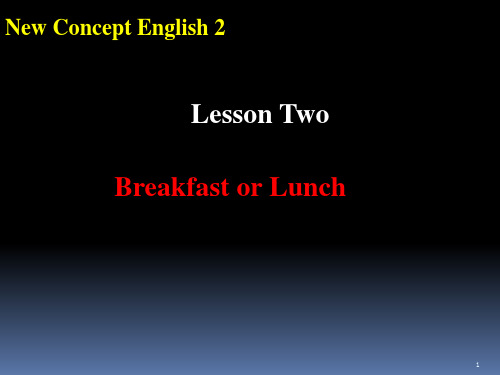
3. Listen again and complete the following text.
It was _S_u_n_d_a_y__. I _n_e_v_e_r__ get up early __o_n__ Sundays. I sometimes stay in bed _u_n_t_il__ lunchtime. Last Sunday I got up very__la_t_e_. I looked out of the window. It was dark _o_u_ts_i_d_e. 'What a day!' I thought. 'It's raining again.' Just then, the telephone _r_a_n_g__ . It was my aunt Lucy. 'I've just arrived __b_y__ train,' she said. 'I'mc_o_m_i_n_g_to see you.'
9
★翻译下列生词和短语( read and finish the following exercise)
呆在床上不起来___st_a_y_i_n_b_e_d___ 直到___u_n_ti_l _______ 起床早__g_e_t_u_p_e_a_rl_y___ 起床晚_k_o_u_t_o_f_th_e__window 重复___r_e_p_ea_t______ 外面__o_u_t_si_d_e______ (铃、电话等)响___ri_n_g________
3
private conversation theatre seat play loudly
新概念英语第二册第二课完美教案Lesson2BreakfastorLunch
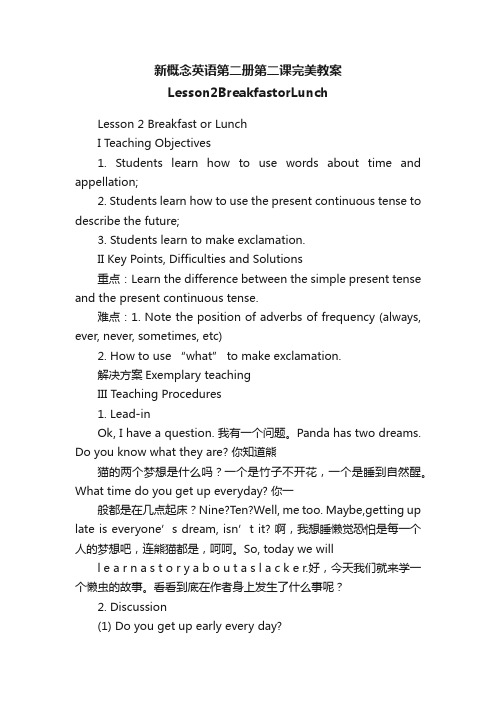
新概念英语第二册第二课完美教案Lesson2BreakfastorLunchLesson 2 Breakfast or LunchI Teaching Objectives1. Students learn how to use words about time and appellation;2. Students learn how to use the present continuous tense to describe the future;3. Students learn to make exclamation.II Key Points, Difficulties and Solutions重点:Learn the difference between the simple present tense and the present continuous tense.难点:1. Note the position of adverbs of frequency (always, ever, never, sometimes, etc)2. How to use “what” to make exclamation.解决方案Exemplary teachingIII Teaching Procedures1. Lead-inOk, I have a question. 我有一个问题。
Panda has two dreams. Do you know what they are? 你知道熊猫的两个梦想是什么吗?一个是竹子不开花,一个是睡到自然醒。
What time do you get up everyday? 你一般都是在几点起床?Nine?Ten?Well, me too. Maybe,getting up late is everyone’s dream, isn’t it? 啊,我想睡懒觉恐怕是每一个人的梦想吧,连熊猫都是,呵呵。
新概念英语第二册第二课(包含课文、练习及答案)
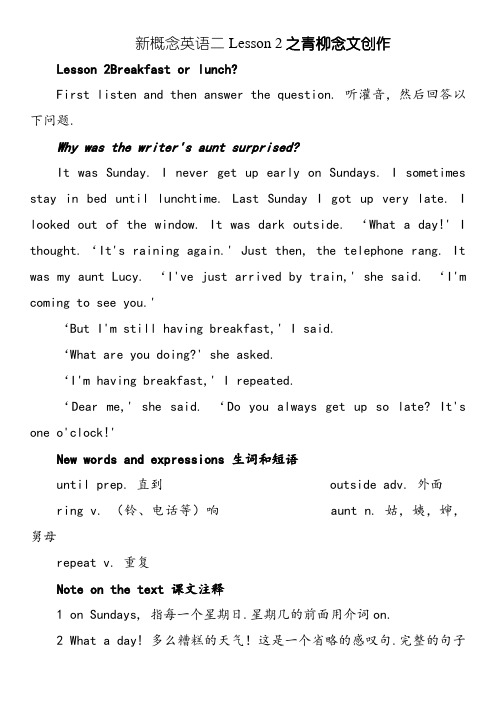
新概念英语二Lesson 2之青柳念文创作Lesson 2Breakfast or lunch?First listen and then answer the question. 听灌音,然后回答以下问题.Why was the writer's aunt surprised?It was Sunday. I never get up early on Sundays. I sometimes stay in bed until lunchtime. Last Sunday I got up very late. I looked out of the window. It was dark outside. ‘What a day!' I thought.‘It's raining again.' Just then, the telephone rang. It was my aunt Lucy. ‘I've just arrived by train,' she said. ‘I'm coming to see you.'‘But I'm still having breakfast,' I said.‘What are you doing?' she asked.‘I'm having breakfast,' I repeated.‘Dear me,' she said. ‘Do you always get up so late? It's one o'clock!'New words and expressions 生词和短语until prep. 直到 outside adv. 外面ring v. (铃、电话等)响 aunt n. 姑,姨,婶,舅母repeat v. 重复Note on the text 课文注释1 on Sundays, 指每一个星期日.星期几的前面用介词on.2 What a day! 多么糟糕的天气!这是一个省略的感叹句.完整的句子应该是What a day it is!英语中的感叹句常常使用what开首,后面紧跟一个名词或名词性短语(包含连络动词),然后是主语和谓语,句尾用感叹号.3 I’m coming to see you. 在这句话中现在停止时用来暗示近期按计划或安插要停止的动作.4 Dear me! 天哪!这也是一个感叹句.2参考译文那是个星期天,而在星期天我是从来不早起的,有时我要一直躺到吃午饭的时候.上个星期天,我起得很晚.我望望窗外,外面一片昏暗.“鬼天气!”我想,“又下雨了.”正在这时,电话铃响了.是我姑母露西打来的.“我刚下火车,”她说,“我这就来看你.”“但我还在吃早饭,”我说.“你在干什么?”她问道.“我正在吃早饭,”我又说了一遍.“天啊,”她说,“你总是起得这么晚吗?现在已经1点钟了!”Summary writing 摘要写作Answer these questions in not more than 55 words.回答下列问题,将答案组成一个段落,不要超出55个单词.1. Does the writer always get up early on Sundays, or does he always get up late?2. Did he get up early last Sunday, or did he get up late?3. Who telephoned then?4. Had she arrived by train, or had she come on foot?5. Was she coming to see him or not?6. Did he say,‘I’m still having breakfast’, or did he say,‘I am still in bed’?7. Was his aunt very surprised or not ?8. What was the time?_____________________________________________________________ _____________________________________________________________ _____________________________________________________________ _____________________________________________________________ _____________________________________________________________ _____________________________________________________________ _____________________________________________________________ _____________________________________________________________ _____________________________________________________________ _______________Key Structures关键句型Now,Often and Always 暗示现在和常常发生的动作Study these statements and questions from the passage.注意以下摘自本课的陈述句和疑问句.Now Often and AlwaysIt’s raining. I never get up early on Sunday.I’m coming to see you. I sometimes stay in bed until lunch time.I’m still having breakfast. Do you alwaysget up so late?What are you doing?Here are some more sentences.请看其他例句:He is still sleeping. He rarely gets up before 10 o’clock.We are enjoy our lunch. We frequently have lunch at this restaurant.I am reading in bed. Do you ever read in bed?Exercises 操练A. Write out these two paragraphs again. Give the right form of the words in brackets.用正确的动词时态填空.1. I am looking out of my window. I can see some children in the street. The children _________ (play) football. They always _________(play) football in the street. Now a little boy _________ (kick) the ball. Another boy _________(run) after him but he can not catch him.2. I carried my bags into the hall.‘What _____you _____(do)’my landlady asked.‘I _______ (leave), Mrs Lynch,’I answered.‘Why _____you _____ (leave)’she asked. ‘You have been here only a week.’‘A week too long, Mrs Lynch,’I said.‘There are too many rules in this house. My friends never _________ (come) to visitme. Dinner is always at seven o’clock, so I frequently_______ (go) to bed hungry. You don’t like noise, so I rarely_________ (listen) to the radio. The heating doesn’t work, so I always __________ (feel) cold. This is a terrible place for a man like me. Gookbye, Mrs Lynch.’B. Note the position of the words in italics in these sentences.注意以下句子中用斜体印出的词的位置:My friends never come to visit me.I frequently go to bed hungry.I rarely listen to the radio.I always feel cold.I never get up early on Sundays.I sometimes stay in bed until lunchtime.Write these sentences again. Put the words in brackets in the right place.改写下列句子,把句尾括号中的词放在合适的位置.1. She answers my letters. (rarely)2. We work after six o’clock. (never)3. The shops close on Saturday afternoon. (always)4. Do you go to work by car? (always)5. Our teacher collects our copybooks. (frequently)6. We spend our holidays abroad. (sometimes)7. I buy gramophone records. (often)8. Do you buy gramophone records? (ever)Special difficulties难点在英语中往往可以用what引导的感叹句来暗示诧异、愤怒、赞赏、喜悦等感情.在感叹句仲主谓语采取正常语序.如课文中的例句“What a day!”注意以下例句:Instead of saying: We can say:除了这种表述方法外:还可以说:It is a terrible day! What a terrible day!This is a beautiful picture! What a beautiful picture! Or: What a beautiful picture this is.Exercise 操练Write these sentences again. Each sentence must begin with What.改写下列句子,用What来引导下列感叹句.1. This is a wonderful garden!2. This is a surprise!3. He is causing a lot of trouble!4. They are wonderful actors!5. She is a hard-working woman!6. It is a tall building!7. It’s a terrible film!8. You are a clever boy!9. She is a pretty girl!10. He is a strange fellow!Supplementary Written ExercisesCOMPREHENSION 懂得1. When Aunt Lucy telephoned _________ .(a) the writer was asleep. (b) the writer was still in bed.(c) the writer had already got up. (d) the writer was having lunch.2. Aunt Lucy was surprised because_________.(a) the writer was having lunch. (b) it was one o’clock.(c) it was late. (d)the writer was having breakfast at lunch time.STRUCTURE 句型3. He sometimes _________ in bed until lunch time.(a) stay (b) is staying (c) stays (d) staying4. He stayed in bed until lunch time. He went _________ bed late last night.(a) in (b) into (c) to (d)at5. He doesn’t get up early on Sundays. He gets up ________.(a) late (b) lately (c) slowly (d) hardly6. ______ did aunt Lucy come? By train.(a) When (b) How (c) Why (d) Wherehe writer can’t see aunt Lucy________. He’s having breakfsat.(a) still (b) now (c) often (d) alwaysVOCABULARY 词汇8. He _________ out of the window and saw that it was raining.(a) looked (b) saw (c) remarked (d) watched9. Jast then, the telephone rang. It rang _________.(a) at once (b) immediately (c) again (d) at that moment10. She was his aunt, so he was her __________.(a) son (b) grandson (c) nephew (d) niece11. Breakfast is the first_________ of the day.(a) food (b) dinner (c) lunch (d) meal12. Aunt Lucy said,‘Dear me’because she was_________.(a) angry (b) surprised (c) tired (d) pleasedSENTENCE STRUCTURE 句子布局Rewrite this sentence, then check your answer against the text:改写下列句子,然后对照课文核对你的答案.I arrived by train a moment ago.I’ve_________________________________________________________________ ____。
新概念二 Lesson2 breakfast or lunch
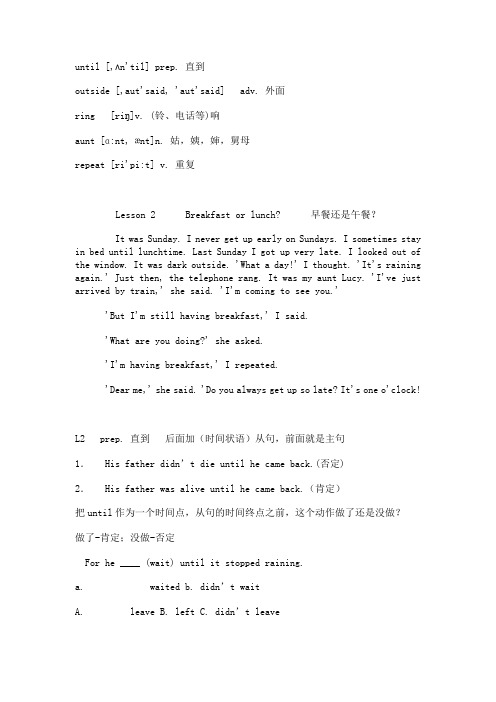
until [,ʌn'til] prep. 直到outside [,aut'said, 'aut'said] adv. 外面ring [riŋ]v. (铃、电话等)响aunt [ɑ:nt, ænt]n. 姑,姨,婶,舅母repeat [ri'pi:t] v. 重复Lesson 2 Breakfast or lunch? 早餐还是午餐?It was Sunday. I never get up early on Sundays. I sometimes stay in bed until lunchtime. Last Sunday I got up very late. I looked out of the window. It was dark outside. 'What a day!' I thought. 'It's raining again.' Just then, the telephone rang. It was my aunt Lucy. 'I've just arrived by train,' she said. 'I'm coming to see you.''But I'm still having breakfast,' I said.'What are you doing?' she asked.'I'm having breakfast,' I repeated.'Dear me,' she said. 'Do you always get up so late? It's one o'clock!L2 prep. 直到后面加(时间状语)从句,前面就是主句1.His father didn’t die until he came back.(否定)2. His father was alive until he came back.(肯定)把until作为一个时间点,从句的时间终点之前,这个动作做了还是没做?做了-肯定;没做-否定For he ____ (wait) until it stopped raining.a. waitedb. didn’t waitA. le aveB. leftC. didn’t leaveoutside adv. It is cold outside. 固定搭配 outside help 外援It’s outside my business. = It’s none of my business. 这不干我的事。
新概念第二册第二课课文讲解
Lesson 2 Breakfast or lunch?早餐还是午餐?【Text】It was Sunday. I never get up early on Sundays. I sometimes stay in bed until lunchtime. Last Sunday I got up very late. I looked out of the window. It was dark outside. ’What a day!’ I thought. ’It’s raining again.’ Just then, the telephone rang. It was my aunt Lucy. ’I’ve javain,’ she said. ’I’m coming to see you.’’But I’m still having breakfast,’ I said.’What are you doing?’ she asked.’I’m having breakfast,’ I repeated.’Dear me,’ she said. ’Do you always get up so late? It’s one o’clock!’【New words and expressions】生词和短语★until prep.直到直到...才;直到...为止后面加(时间状语)从句,前面就是主句1) His father didn’t die until he came back. (肯定)直到他回来,他爸爸才死.2) His father was alive until he came back. (否定)直到他回来为止,他爸爸都是活着的.到他回来这一点之前,没死: not die;活的:不加not.把until作为时间终止线从句的时间终点之前,这个动作做了还是没做?做了——肯定; 没做——否定.he _____(wait) until it stopped raining.A. waitedB.didn’t waitA.leaveB.leftC.didn’t leaveI stay in bed until twelve o’clock.I didn’t get up until 12 o’clock.A(C)_★outside adv.外面作状语He is waiting for me outside.It is cold outsid.★ring (rang.rung) v.(铃、电话等)响(刺耳的)[注]这种响是刺耳的,往往是提醒人做某事The telephone(door bell) is ringing.Every morning the clock rings at 6. 这钟每天早上6点响。
(完整word版)新概念第二册Lesson2Breakfastorlunch详解
Lesson 2 Breakfast or lunch?1 until [ən'til, ʌn'til] prep.直到2 outside [aut’said] ad.外面3 ring [riŋ] v。
(铃、电话等)响4 aunt [ɑ:nt] n。
姑,姨,婶,舅妈5 repeat [ri'pi:t] v。
重复这些单词也太小菜了吧?It was Sunday。
I never get up early on Sundays. I sometimes stay in bed until lunchtime. Last Sunday I got up very late. I looked out of the window。
It was dark outside。
’What a day!' I thought. 'It's raining again。
’ Just then, the telephone rang。
It was my aunt Lucy。
'I’ve just arrived by train,' she said. 'I’m coming to see you。
'’But I'm still having breakfast,' I said.'What are you doing?’ she asked.’I’m having breakfast,' I repeated.'Dear me,' she said。
’Do you always get up so late? It's one o’clock!'参考译文:那是个星期天,而在星期天我是从来不早起的,有时我要一直躺到吃午饭的时候. 上个星期天,我起得很晚. 我望望窗外,外面一片昏暗. “鬼天气!” 我想, “又下雨了。
新概念二册Lesson 2 课文
§ Lesson— 2 Breakfast or lunch?早餐还是午餐?【课文讲解】1、It “虚主语”。
①、It’s already nine o’clock. 已是9点了。
【指时间】②、It is about 5 kilometers from the company to my home.从公司到我家大概有5公里。
【指距离】③、It was very quiet in the garden. 花园里很安静。
【指环境】④、It’s very cold today. 今天很冷。
【指天气等自然现象】It is raining. 正在下雨。
It’s 37℃today. 今天气温是37度。
⑤、--- How’s it going? “情况如何?”【笼统地谈论某情况】--- Well, not so good. “不是很好。
”⑥、It is a lovely baby. 这是个可爱的小婴儿。
【指人】It was my aunt Lucy. 是我姑妈Lucy打来的。
2、never adv. 从不;永不;决不;I will never forget your kindness. 我永远忘不了你的好意。
We never flinch from difficulties. 在困难面前我们决不退缩。
She never goes to the cinema. 她从来不看电影。
Never in my dreams did I think I would meet her again.我做梦都没想到会再见她。
★never可用于句首以加强语气,其后的句子要主谓倒装。
3、on Sunday s每逢星期天【on】后面所接的时间多与日期有关。
1.表示在具体的某一天(如日期、生日、节日或星期几)。
如:on May 4th,1919;on my birthday;on Teachers’ Day;on Monday 等。
新概念二 Lesson 2 Breakfast or Lunch
Unit 2 Breakfast or Lunch◆Warm up1、一般现在时和现在进行时2、代词:it作形式主语的用法3、副词:频度副词的排序和位置◆Listening1. What was the weather like last Sunday? The weather was dark, and it was raining.2. Who was coming to see the writer? It was aunt Lucy.3. Why was the writer’s aunt surprised? Because it was lunchtime, but the writer was still having breakfast.◆vocabulary• until [ənˈtɪl] prep. & conj. 直到⑴until 用于肯定句中,意为“直到......为止”,主句中的谓语动词应用延续性动词。
I waited for you until two o’clock yesterday. 我昨天一直等你到两点。
I watched TV until she came back. 我看电视一直看到她回来。
⑵...not... until ... “直到......才”,主句中的谓语动词应用短暂性(非延续性)动词,此时until可用before代替。
He did not go to bed until 12. 他12点才睡觉。
I did not watch TV until she came back. 直到她回来我才开始看电视。
• outside [ˌaʊtˈsaɪd] adv. & n. & prep. 在外面【记忆】outside = out外面+side边→adj.&n.&adv.外面[的,地],外部[的,地]【反义】inside adv. 在里面【拓展】outsider n. 局外人、圈外人outsize adj. 特大的【搭配】outside and in 里里外外at the (very) outside 至多、充其量get outside of (非正式)吃、喝【辨析】external, exterior, outer, outside, outward 这些形容词均可表示"外部的"之意。
- 1、下载文档前请自行甄别文档内容的完整性,平台不提供额外的编辑、内容补充、找答案等附加服务。
- 2、"仅部分预览"的文档,不可在线预览部分如存在完整性等问题,可反馈申请退款(可完整预览的文档不适用该条件!)。
- 3、如文档侵犯您的权益,请联系客服反馈,我们会尽快为您处理(人工客服工作时间:9:00-18:30)。
Breakfast or Lunch?
Why was the writer’s aunt surprised?
It was Sunday. I never get up early on Sundays. I sometimes stay in bed until lunchtime. Last Sunday I got up late. I looked out of the window. It was dark outside. “What a day!” I thought. It’s raining again. Just then, the telephone rang. It was my aunt Lucy. “I’ve just arrived by train,”she said. “I’m coming to see you.”
“But I’m still having breakfast,” I said.
“What are you doing?” she asked.
“I’m having breakfast,” I repeated.
“Dear me!” she said. “Do you always get up so late? It’s one o’clock!”
New words and expressions:
until 直到outside外面
arrive 到达thought think的过去式
ring (铃、电话等)响repeat重复
surprised 惊讶的
Answer these questions in not more than 50 words.
1.Does the writer always get up early on Sundays, or does he always get up late?
2.Did he get up early last Sunday, or did he get up late?
3.Who telephoned him then?
4.Had she just arrived by train, or had she come on foot?
5.Was she coming to see him or not?
6.Was his aunt very surprised or not?
7.What was the time?
Now, often, always, rarely, never, sometimes, frequently和ever 的用法。
1. He is still sleeping.
2. He rarely gets up before 10 o’clock.
3. We’re enjoying our lunch.
4. We frequently have lunch at this restaurant.
5. I’m reading in bed.
6. Do you ever read in bed?
7. I rarely listen to radio. 8. I always feel cold.
9. I never get up early on Sundays. 10. I sometimes stay in bed until lunchtime.
1.She answers my letters. (rarely)
2.The shops close on Saturday afternoon. (always)
3.We work after six o’clock. (never)
4.Do you go to work by cay? (always)
5.Our teacher collects our exercise books. (frequently)
6.We spend our holidays abroad. (sometimes)
7.I buy CDs. (often)
8.Do you buy CDs? (ever)
Exercise
Write these sentences again. Each sentence must begin with what.
1.this is a wonderful garden!
2.This is a surprise!
3.They are wonderful actors!
4.She is a hard-working woman!
5.It is a tall building!
6.It’s a terrible film!
7.You are a clever boy!
8.She is a pretty girl!
9.He is a stranger guy!
Multiple choice questions
1.When Aunt Lucy telephoned ____________.
2.Aunt Lucy was surprised because _____________.
3.He sometimes __________ in bed until lunchtime.
4.He stayed in bed until lunchtime. He went _________ bed late last night.
5.He doesn’t get up early on Sundays. He gets up ____________
6.________did Aunt Lucy come? By train.
7.The writer can’t see Aunt Lucy ___________. He is having breakfast.
8.He _________ out of the window and saw that it was raining.
9.Just then, the telephone rang. It rang ____________.
10.She was his aunt, so he was her _________.
11.Breakfast is the first _________ of the day.
12.Aunt Lucy said “Dear me,” because she was ___________.。
